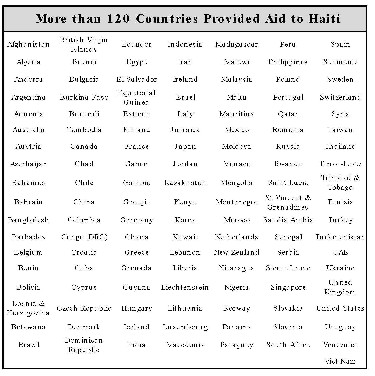The Two Sides of Aid Diplomacy
Public diplomacy through the distribution of aid has been a staple component of the public diplomacy strategies of various countries. This month we have seen numerous governments provide aid to the people of Haiti. Since the tragic earthquake of January 12, countless stories of aid diplomacy have appeared in the news. From these stories highlighted in PDiN, two public diplomacy related themes have dominated the headlines: 1) That government aid to Haiti is not a purely altruistic act, but a strategic foreign policy move to enhance the donor-country‘s soft power in the global arena; and 2) That the billions of dollars in economic assistance flowing into the small island nation is not designed to institute a patronage but to form partnerships to rebuild and develop Haiti.

U.S. soldier providing food packages to Haitian children after the recent earthquake.
© Creative Commons, Flickr, The US Army
While “Aid diplomacy” exemplifies economic power (hard power), it is in fact a soft power enhancing tool of public diplomacy. The global public is watching to see which nations step up in times of crisis—and which are absent. The countries that are deemed the most altruistic—ones with no apparent ulterior agendas—stand to gain the most. Some gain soft power not for their donation but for putting aside conflicts with others to aid the country in need, as China and Taiwan have demonstrated in the last few weeks. Poor countries such as the Democratic Republic of Congo and Senegal which do not traditionally donate emergency funds have received press coverage and global attention, both positive and negative for their contributions to Haiti.
More than one hundred countries pledged economic assistance to Haiti while acknowledging that humanitarian aid is not the only solution for rebuilding the devastated country. Some news articles argued that foreign aid should be halted, partnerships should be developed and institutions should be created in order to successfully reconstruct Haiti. Public diplomacy seeks to facilitate the creation of mutually beneficial relationships and the earthquake in Haiti has created the conditions for many nations to join together as partners to create a better future for the country.
These news stories demonstrate how public diplomacy can serve to enhance—or damage—a nation‘s soft power standing. But the fact remains that Aid diplomacy is a multifaceted dimension of public diplomacy which not only provides assistance to countries in need but can facilitate the foreign policy goals of the donor nation.

To view a larger image of the list, click here.
Source: The Guardian
Issue Contents
Most Read CPD Blogs
-
January 29
-
January 20
-
January 28
-
February 6
-
January 8
Visit CPD's Online Library
Explore CPD's vast online database featuring the latest books, articles, speeches and information on international organizations dedicated to public diplomacy.









Add comment